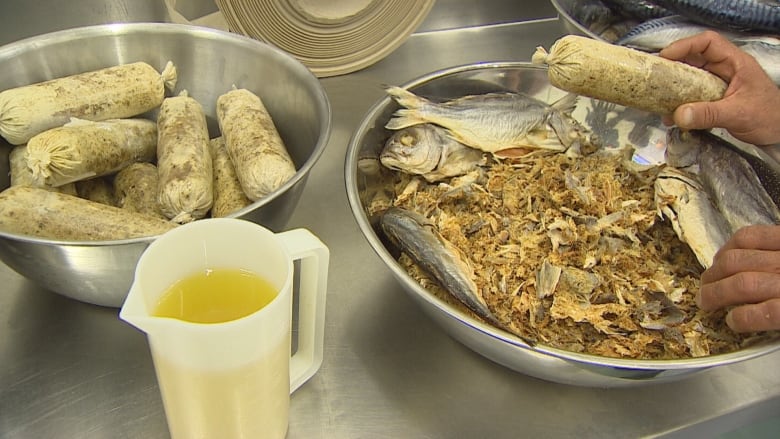Atlantic lobster fishers turning to new bait sausage amid forage fish decline | CBC News
A sausage-like concoction that aims to replace a quickly dwindling source of bait for lobster traps appears to be a success with fishermen following a series of preliminary trials, according to the scientist behind it.
Bait Masters Inc. has developed a new bait using 75 per cent less herring and mackerel than would usually go in a trap. It’s made up of fish, oil, and other organic matter squeezed in a biodegradable casing.
The stocks of mackerel and herring, small forage fish used as bait by the vast majority of lobster fishermen, are very low and purchasing them is growing more expensive as the federal government cuts catch quotas.
Bait Masters is seeing an increased demand this year for its alternative bait, according to University of Prince Edward Island researcher Krishna Thakur, who has teamed up with the company.
“That’s a positive sign that the fishermen are willing to adapt this new bait type,” he told CBC’s Mainstreet Wednesday.
Katie Schleit of Oceans North, a charitable organization focused on marine conservation, said mackerel stocks are nearly depleted in the Atlantic region.
The federal fisheries department itself says the allowable mackerel catch is just as likely to lead to declines as increases, she said, while herring is in a similar situation.
“It’s a really great concern,” Schleit told Mainstreet.
These species are known as forage fish since they sit in the middle of the food chain, Schleit said, and eat smaller creatures while also being food for larger fish like tuna.
In 2019, scientists said the spawning population of mackerel was down 86 per cent from pre-2000 levels, and the number of fish surviving to breed was at all-time lows.

Schleit said there are a few factors behind the decline, including years of overfishing, but also climate and predator changes.
Although total allowable catch limits continue to be cut back, Schleit doesn’t think they’re low enough yet to really give these fish species a chance to bounce back.
Schleit said a recent scientific paper estimated two pounds of fish are used to catch one pound of lobster in the Atlantic fishery, which amounts to roughly 400 million pounds of fish in lobster traps each year.
“With the bait issue it’s really been a conservation issue … that’s sort of been below the radar,” Schleit said.
She sees a twofold solution for the problem: cut forage fish quotas even more, and have fishers cut back on their bait use or move to alternative options.

That’s where Thakur and Bait Masters come in.
Although Thakur said it was a challenge at first to find enough fishermen to participate in his research with the new bait, eventually 12 fishers signed on for the P.E.I. trial.
Through this work, Thakur said he found that on average the new bait was catching the same number of lobster compared to regular herring and mackerel.
The fishermen reported being happy with the bait, which is slightly cheaper than traditional herring and mackerel, and holds together in the water longer.
Although it’s hard to tell without doing specific trials around other Atlantic provinces, Thakur said he believes the new bait would work just as well in other areas.
Schleit said it’s going to take solutions like this to move the forage fish issue forward, being tried on the water by fishers who know what works and what doesn’t.
For all the latest Technology News Click Here

